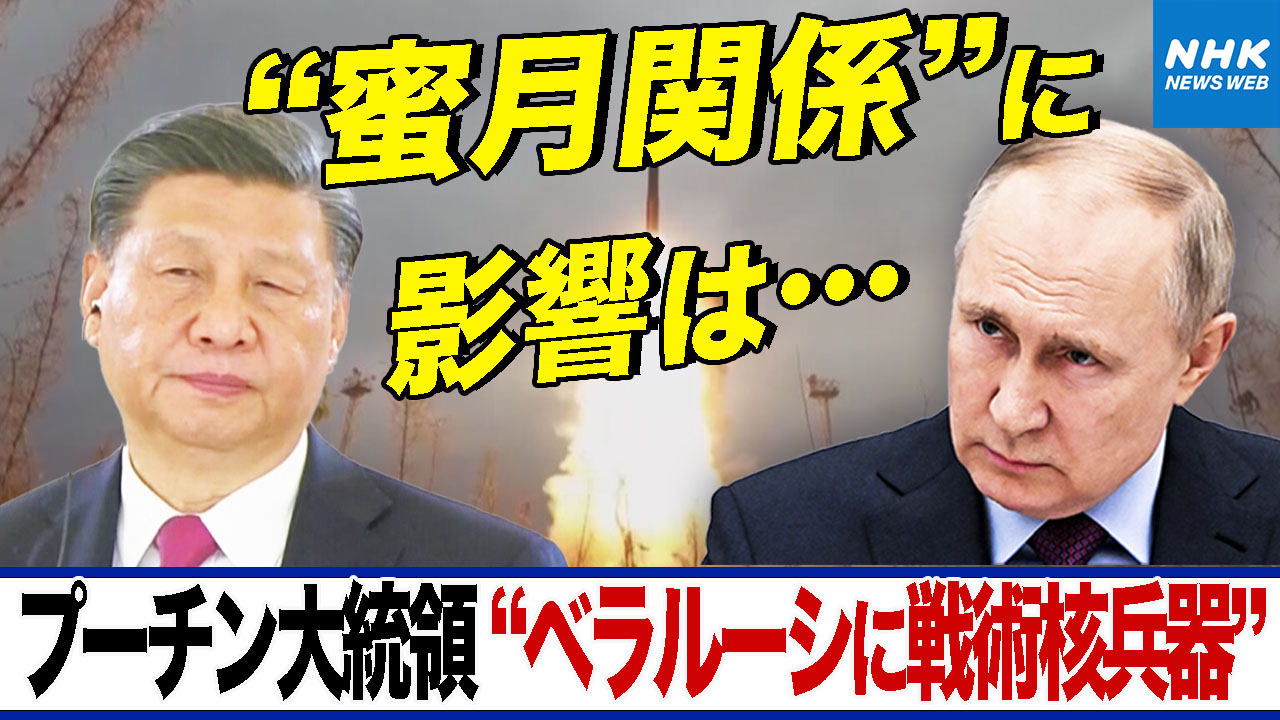President Putin has announced a policy of deploying tactical nuclear weapons in Belarus, an ally of Belarus, and is strengthening his restraint on the Western side, which is strengthening military support for Ukraine.
It is attracting attention whether this policy will not have a negative impact on the honeymoon relationship between Russia and China. This is a commentary by caster Hideki Yui.
(The video is 5 minutes 04 seconds. It cannot be seen in data broadcasting)
Putin "Deployment of Tactical Nuclear Weapons in Belarus"
Regarding the situation in Bakhmut, a fierce battle zone in Donetsk Oblast in eastern Ukraine, where the Russian army is aiming to seize, there is a view that the momentum of the Russian offensive has been lost.
Against this backdrop, Russian President Vladimir Putin announced his intention to deploy tactical nuclear weapons in neighboring Belarus, with which he is an ally, and announced that a facility to store nuclear weapons will be built in Belarus by July 7.
Yuyuki Hasegawa, a researcher at the National Institute for Defense Studies at the Ministry of Defense who is familiar with Russian security, commented on Russian President Vladimir Putin's announcement that he would deploy tactical nuclear weapons in Belarus, saying, "This is a new phase in which the nuclear card has been played in a way that involves other countries. Isn't this a message to Russia that it is strengthening its military capabilities?"
He also stated that the Russian side is unlikely to use tactical nuclear weapons at this time, and that the deployment of tactical nuclear weapons in Belarus will not bring about a significant change in the war situation.
On top of that, Hasegawa said, "The Russian side is considerably inferior in conventional weapons such as tanks compared to NATO = North Atlantic Treaty Organization and Western countries. He pointed out that it is necessary to ascertain the intentions of the nuclear arsenal as it is expected to continue to show off its nuclear forces and continue to threaten them.
On the 26th, the Ukrainian Foreign Ministry condemned President Putin's remarks as "a new provocation by the Putin regime that is criminal," and the NATO spokesman also criticized it as "dangerous and irresponsible claims" from Ukraine and the West.
Yui caster's commentary "Some pointed out that President Xi's mentality was crushed"
President Putin has announced a policy of deploying tactical nuclear weapons in Belarus.
It is attracting attention whether this policy will not have a negative impact on the honeymoon relationship between Russia and China.
At the meeting between President Putin and Chinese President Xi Jinping in Moscow last week, the two leaders issued a joint statement on strengthening relations, in which they read:
"All nuclear-weapon states should not deploy nuclear weapons abroad and should remove nuclear weapons deployed abroad,"
so President Putin's policy of deploying nuclear weapons in Belarus is incompatible with the China-Russia Joint Statement announced a few days ago, and it has been pointed out that President Xi Jinping has crushed his mentality.
One of the people who pointed it out was former U.S. Ambassador to Russia Michael McFaul.
McFaul, who is said to be one of America's leading Russian experts who has met with President Putin many times, wrote on Twitter: "Putin did the opposite of the joint statement, and both Putin and Lukashenko insulted Xi Jinping. I don't think this decision will be well received in China."
Regarding the point that "China was insulted," what does China actually think about President Putin's announcement?
A spokesman for the Chinese Ministry of Foreign Affairs responded as follows on the 27th.
"All parties should focus on diplomatic efforts for a peaceful resolution of the Ukraine crisis and promoting de-escalation,"
was a frosty response, or at least not welcome.
In fact, regarding President Xi Jinping's visit to Russia, while there were many voices of caution from Europe and the United States regarding the Sino-Russian honeymoon, there were also voices that appreciated the wording of nuclear weapons mentioned earlier.
One of them was High Representative Borrell, the EU's foreign minister, who praised China by saying, "One important thing is that President Xi's visit has reduced the risk of nuclear war."
European political leaders, including EU High Representative Borrell and Commission President von der Leyen, as well as Spanish Prime Minister Sanchez and French President Emmanuel Macron, will reportedly visit China in the near future to urge them to play a role in stopping Russia's military invasion.
Will China show concrete measures toward peace?
Or will they continue to stand by Russia?
The focus is likely to be on how to respond at the meeting of European leaders.

